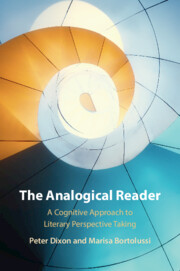Book contents
- The Analogical Reader
- The Analogical Reader
- Copyright page
- Dedication
- Contents
- Figures
- Tables
- Boxes
- Chapter 1 Introduction
- Chapter 2 An Analysis of Perspective and Perspective Taking
- Chapter 3 Perspective Taking in Life
- Chapter 4 Perspective Taking and Literature
- Chapter 5 Processing Components of Perspective Taking
- Chapter 6 Challenges to Perspective Taking
- Chapter 7 Evidence for Analogy in Perspective Taking
- Chapter 8 Conclusions
- References
- Index
Chapter 3 - Perspective Taking in Life
Published online by Cambridge University Press: 09 November 2023
- The Analogical Reader
- The Analogical Reader
- Copyright page
- Dedication
- Contents
- Figures
- Tables
- Boxes
- Chapter 1 Introduction
- Chapter 2 An Analysis of Perspective and Perspective Taking
- Chapter 3 Perspective Taking in Life
- Chapter 4 Perspective Taking and Literature
- Chapter 5 Processing Components of Perspective Taking
- Chapter 6 Challenges to Perspective Taking
- Chapter 7 Evidence for Analogy in Perspective Taking
- Chapter 8 Conclusions
- References
- Index
Summary
Although our ultimate goal is an analysis and theory of perspective taking in literature, an important insight is that perspective taking in reading literature is subject to the same factors and constraints and may depend on the same types of processes as perspective taking in real life. In Chapter 3, we review research in social and personality psychology that is applicable to literary perspective taking and that can help us advance our understanding of how readers make sense of fictional minds. Under the general umbrella term of “mind reading,” theory of mind, theory theory, and simulation theories offer competing explanations of how individuals make sense of other minds. We argue that interpreting these ideas in terms of analogy provides the basis for a more coherent analysis. We also consider the problem of empathy and how it is related to mind reading. Our analysis is that empathy should be thought of as emotional perspective taking, and we apply our analogical inference approach here as well. Finally, we consider the neural bases of perspective taking and discuss how different brain networks may be related to the components of perspective taking by analogy.
Keywords
Information
- Type
- Chapter
- Information
- The Analogical ReaderA Cognitive Approach to Literary Perspective Taking, pp. 40 - 79Publisher: Cambridge University PressPrint publication year: 2023
